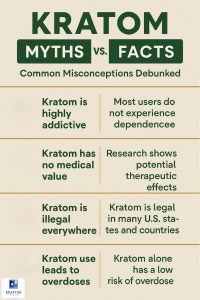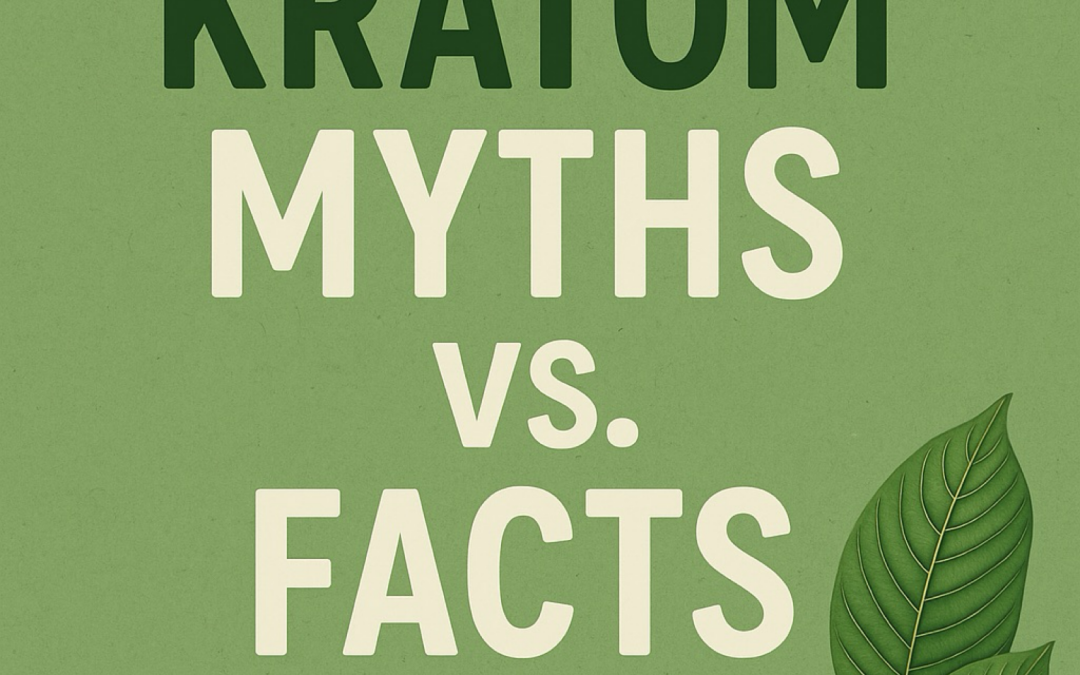⚖️ Separating Truth from Fiction in the World of Natural Kratom
Kratom has been used for centuries in Southeast Asia, but as it gains popularity in the West, it’s also attracted its fair share of misinformation. From labeling it as a “synthetic drug” to calling it an “opioid,” the internet is full of myths that confuse potential users and misrepresent what this natural plant really is. In this article, we break down the most common kratom myths vs. facts, so you can make informed decisions.
✅ Key Points
-
Kratom is a natural botanical from Southeast Asia, not a synthetic substance.
-
It is not classified as an opioid, although it interacts with some of the same receptors.
-
Many reports of dangers stem from adulterated or synthetic products, not natural kratom.
-
Studies and centuries of use support the safety of full-spectrum, all-natural kratom.
-
Kratom USA provides pure, lab-tested kratom with nearly 20 years of trusted service.
🌿 Myth #1: Kratom Is a Synthetic Drug
🟢 Fact: Kratom is 100% natural.
Kratom (Mitragyna speciosa) is a tropical tree native to countries like Thailand and Indonesia. The leaves are harvested, dried, and ground into powder or brewed as tea—no chemical processing needed.
🔬 Researchers in Phytomedicine confirm that kratom contains natural alkaloids like mitragynine and 7-hydroxymitragynine, both found directly in the leaf itself.
💊 Myth #2: Kratom Is an Opioid
🟢 Fact: Kratom is not pharmacologically classified as an opioid.
While kratom interacts with opioid receptors, it behaves very differently from traditional opioids. Kratom doesn’t cause the same respiratory depression—one of the deadliest risks associated with opioid overdose.
🧪 In fact, a 2024 review in Frontiers in Pharmacology explains how kratom’s alkaloids act as “partial agonists” at mu-opioid receptors, which reduces the risk of severe side effects.
🚨 Myth #3: Kratom Is Dangerous and Unregulated
 🟢 Fact: Natural kratom is safe when sourced from a trustworthy vendor.
🟢 Fact: Natural kratom is safe when sourced from a trustworthy vendor.
Problems often arise when people consume adulterated or synthetic kratom extracts with high concentrations of 7-hydroxymitragynine. Natural kratom, when taken responsibly, has a long history of safe use.
🎯 Tip: Always buy from companies like Kratom USA, which provide lab-tested, pure, and natural kratom without additives.
🛑 Myth #4: Kratom Is Addictive
🟢 Fact: Kratom has a low potential for dependence when used responsibly.
Just like coffee (which also contains alkaloids), kratom can lead to mild physical dependence in some users. However, most users report being able to take breaks without serious withdrawal.
📣 Testimonial:
“I use kratom 4–5 days a week for my lower back pain. On days I don’t take it, I feel fine. It’s nothing like the painkillers I used to rely on.”
— Tamika R., Austin, TX
⚖️ Myth #5: Kratom Is Only Used Recreationally
🟢 Fact: Most users take kratom for wellness reasons.
Surveys show that people use kratom for:
-
Pain relief
-
Energy and focus
-
Anxiety and stress relief
-
Mood enhancement
-
Post-workout soreness
A 2020 Johns Hopkins study found over 90% of kratom users reported using it for health-related benefits.
🧬 Myth #6: All Kratom Is the Same
🟢 Fact: There’s a big difference between natural full-spectrum kratom and synthetic isolates.
Synthetic kratom extracts can be dangerously potent. Full-spectrum kratom preserves the natural balance of alkaloids, providing a gentler, more predictable experience.
💚 That’s why Kratom USA proudly sells only natural kratom—tested, pure, and trusted since the early 2000s.
🧾 Key Points Recap
-
Kratom is a natural plant, not synthetic or artificial.
-
It is not classified as an opioid, though it interacts with opioid receptors.
-
Problems arise with synthetic or adulterated kratom, not pure leaf.
-
Kratom has a long record of traditional use in Southeast Asia.
-
Choose full-spectrum, all-natural kratom from trusted vendors like Kratom USA.
❓ FAQ: Kratom Myths vs. Facts
Is kratom legal in the U.S.?
Kratom is legal in most states, but some local bans exist. Check your local laws.
Can kratom cause an overdose?
Natural kratom alone has a very low risk of overdose. However, synthetic kratom products or mixing kratom with other drugs can be dangerous.
Does kratom affect the brain like opioids?
It interacts with the same receptors but is less likely to cause sedation, addiction, or overdose.
Is there research supporting kratom’s safety?
Yes! Studies from Johns Hopkins, NIDA, and others show that most users report positive health benefits and low risk of harm.
🧠 Conclusion: Know the Facts, Dismiss the Fiction
Kratom’s misunderstood reputation stems from misinformation and the abuse of synthetic forms. Natural kratom, especially when sourced from experienced vendors like Kratom USA, has been used safely for generations.
✔️ Educate yourself.
✔️ Choose full-spectrum, natural kratom.
✔️ Debunk the myths—and enjoy the benefits responsibly.


